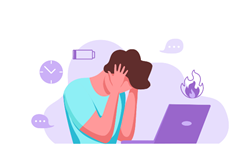Introduction

Nursing staff are brilliant at coping and often have a strong belief that they should be able to cope with anything at all that comes along in their personal or professional domains.
This belief generates a superhuman philosophy that doesn’t make it easy for nursing staff to admit that they are experiencing stress. People who know you well at work or at home may be trying to tell you to slow down or take time out. You might know something needs to change, but feel the pressure to carry on regardless.
Showing signs of stress does not mean you cannot cope. Nursing staff are as human as anyone else and there are limits to the pressures that you can endure. To admit to being stressed does not equal not coping - quite the opposite - knowing and owning your limitations enables you to look for ways of managing stress and coping more effectively.
In this resource we will explore the signs and symptoms, resources and support and to remind ourselves what a healthy workplace should look like and what our employers should be doing to achieve that.
While many of you might be reading this with a healthy curiosity if, at any time, your thoughts and feelings become a bit much and you need some extra support our counselling service may be able to help you. You can contact our advice team who can make an appointment for you.









